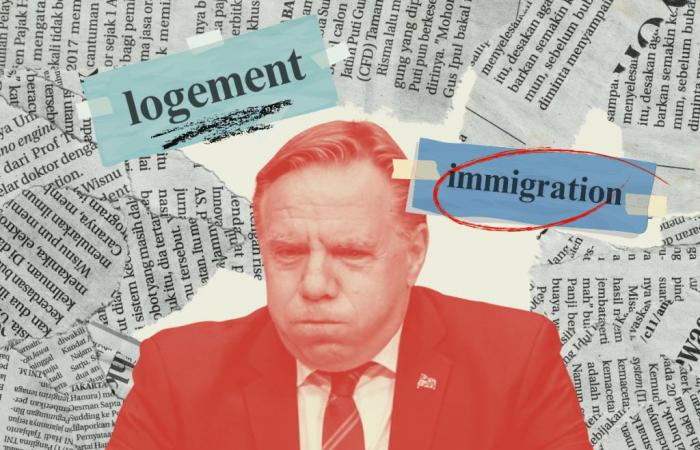Advertisement
An analysis by the Observatory of Racial Inequalities in Quebec confirms that a discourse associating the housing crisis with immigration has been gaining momentum in the media since January. Meanwhile, the Quebec government wants to reduce temporary immigration, but is making little progress on issues considered crucial by the housing community, such as the construction of social housing. The Observatory also recalls that this discourse would increase the risks of discrimination for immigrants and racialized people.
François Legault affirmed last week that temporary immigrants would be “100% responsible” for the housing crisis. He therefore asked Justin Trudeau to “reduce the number of temporary immigrants to Quebec” so that “Quebecers can find housing, our children have access to qualified teachers, so that our sick people are treated and so that the decline of the French is reversed.
While this is a particularly striking case, such comments blaming immigrants for the housing crisis are not new: they are part of a trend that has been growing sharply for several years, and even more so since the beginning of 2024.
In a report published last Tuesday, the Observatory of Racial Inequalities in Quebec (OIRQ) reports a significant increase in articles mentioning the terms “housing” and “immigration/immigrants” together in the main Quebec newspapers since 2022.
Based on a quantitative analysis of articles published in Le Devoir, Le Droit, La Presse and Le Soleil between 2019 and 2024, the researchers identified just over 200 joint mentions per year from 2019 to 2021, compared to 471 mentions in 2022, and more than 600 mentions in 2023.
Based on data from January and February 2024, the researchers anticipate that this figure should further increase dramatically, reaching 1,400 mentions by the end of the year, an increase of 659% in five years. .
It should be noted that the OIRQ’s quantitative analysis includes articles that attribute the housing crisis to immigration, but also those that attack this causal link. The analysis therefore aims to show a growing “media enthusiasm” for the debate on the role of immigration in the current crisis.

Media craze
The OIRQ analysis shows that the association between housing and immigration issues in the media previously remained at a certain level, around 200 mentions per year. This figure remained stable even between 2020 and 2021, when the number of new arrivals in Quebec fell to its lowest since 2016 due to the COVID-19 pandemic.
We note a good increase in 2022 then in 2023, but the major public debate seems to have broken out at the beginning of 2024.
Last January, a National Bank study affirmed a causal link between the housing crisis and immigration, positing that Canada had exceeded its economic capacity to welcome immigrants. In the following days, a series of opinion articles published in Le Devoir intensified the media enthusiasm for this speech associating the housing crisis with the increase in immigration, notes the OIRQ.
The speech was then used by politicians to justify their attempts at immigration reform, which received massive media coverage that continues to fuel the conflation of the housing crisis with immigration.
At the same time, numerous articles have emerged to question the causal link, deemed “simplistic” by the OIRQ, between the housing crisis and the increase in immigration, referring in particular to the opinions of defense groups tenants and research institutes.
The latter, including the OIRQ, denounce that the housing crisis does not arise from a lack of available housing, but is first and foremost a problem of affordability which results from the lack of investment in the construction of housing. social and the absence of real rent control, in particular.
A speech that distracts attention
For the OIRQ, we must question the social function fulfilled by this amalgamation of the housing crisis and immigration.
The OIRQ, as well as the tenant defense groups interviewed for the report, emphasize that “the current discourse serves a distracting function […] directing attention to immigration rather than the lack of investment in housing in previous years.”
” There is [beaucoup] energy is focused on immigration reform, supposedly for the housing crisis, when that is not what will solve the housing crisis. »
Geneviève Vande Wiele Nobert
Since the start of the year, François Legault has frequently urged the federal government to curb the “excessive” influx of asylum seekers which would accentuate the housing crisis in Quebec. He also calls for regaining control over the arrival of foreign students and temporary workers, accused of being the source of housing problems, but also of access to public services.
During the same period, a series of reforms were implemented or proposed at the federal level to reduce the number of new arrivals, under the pretext of alleviating pressure on housing. Immigration Minister Marc Miller, for example, announced a 35% reduction in the number of study permits issued in the next two years, the reinstatement of the visa requirement for Mexican nationals, as well as a plan to increase the proportion of temporary residents in the Canadian population from 6.2% to 5% by 2027.
In an interview, Geneviève Vande Wiele Nobert, co-principal researcher of the report, believes that there is a clear use of this amalgam by the political class to exonerate themselves. “At the moment there is [beaucoup] energy is focused on immigration reform, supposedly for the housing crisis, when that is not what will solve the housing crisis. Tenant rights groups have been proposing solutions for years. They are unfortunately ignored by politicians,” she laments.
In a bulletin published this spring, the Popular Action Front in Urban Redevelopment (FRAPRU) warned of the danger of confusing the housing crisis and immigration, in that it risks giving rise to bad decisions in matters of migration policies, as well as construction initiatives without regard to actual affordability.
In 2022, FRAPRU submitted a Comprehensive Housing Policy to the Quebec government, uniting the voices of more than 500 community, union, student and other organizations. FRAPRU is asking to finance 50,000 social housing units in five years in order to meet the most pressing housing needs for the least well-off tenants.
Last November, the two levels of government announced $1.8 billion to build 8,000 new social and “affordable” housing units. The Quebec government is content with this and does not provide new funds for the construction of such housing in its 2024-2025 budget.
In total, the target of 23,000 social and affordable housing units over five years established by the Legault government is therefore well below the needs estimated by housing rights groups. Especially since the exact share of social housing outside the private market remains unknown.
A speech that penalizes the victims
The association of the housing crisis with immigration is also worrying because “this discourse completely ignores the reality on the ground, in which immigrants and racialized people are the first victims of the housing crisis,” conclude the authors. of the OIRQ report.
Indeed, after interviewing stakeholders who work in housing organizations, the OIRQ underlines that temporary immigrants, especially asylum seekers, are faced with higher risks of abuse of their rights. on the part of owners, in particular because of the language barrier and lack of awareness of their rights as tenants.
During the launch of the report, a speaker present also recalled that temporary immigrants are more vulnerable due to their ineligibility for social housing.
Faced with the urgency of finding housing, immigrant families often find themselves in housing that does not correspond to the size of the household, or which has severe sanitation problems.
The research team also notes that the discourse presenting immigrants as a threat to housing poses additional risks of discrimination for immigrant and racialized people looking for housing. ” The speech […] fuels stereotypes. There are a lot of owners who will use it and people feel it too,” reports a stakeholder interviewed by the OIRQ.
In an interview, Geneviève Vande Wiele Nobert also recalls that this is not the first time that socio-political problems have been attributed to immigrants. She indicates that it is easy for politicians to use immigrants as scapegoats, because this corresponds to the preconceived ideas that society has regarding immigrants, seen as an Other, as an source of concern.
“After discussing with the speakers, I realized that the [supposé] The causal link between the housing crisis and immigration has existed for years in social dynamics, even before the media started to take an interest in it,” she says. “This kind of speech is popular, there is an appetite for it. »








